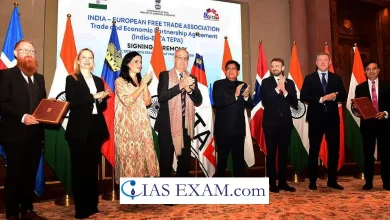Heat faced by Indian Spices in the world over
GS Paper 2 - Awareness in the field of Science and Technology

Context
Recently, a number of countries from all over the world have announced an investigation into possible contamination of spice mixes sold by top Indian brands like MDH and Everest Masalas.
The complaints cite the presence of Ethylene Oxide (ETO), a toxic chemical used as a food stabilizer, beyond permissible limits. The Spice Board of India, in response, has initiated mandatory testing of products shipped abroad The international scrutiny has also stirred a demand for the FSSAI to ensure stringent quality checks on spices and curry powders sold in domestic markets.
About Ethylene Oxide (ETO)
- Ethylene oxide is a flammable, colorless gas at temperature above 51.3 F (10.7 C). When used directly in the gaseous form or in non-explosive gaseous mixtures with nitrogen or carbon dioxide, ETO serves as a disinfectant, fumigant, sterilizing agent, and insecticide.
- ETO has also been reported to be produced from natural sources. In certain plants, ethylene (a natural plant growth regulator) is degraded to ethylene oxide. ETO is also generated from water – logged soil, manure and sewage sludge.
- It is a prohibited pesticide that is used as a sterilizing agent in the food industry, including spices.
- Residues of ETO can lead to the formation of toxic and carcinogenic compounds, such as ethylene glycol. Long-term exposure to ethylene oxide is associated with various health risks, including cancers like lymphoma and leukemia.
- In the recent past, Indian-made products, including cough syrups, have been linked to incidents where ethylene glycol contamination resulted in fatalities, particularly among children in countries like Cameroon, Gambia, Indonesia, and Uzbekistan.
Impact on India’s Spice Exports
- With nearly $700 million in exports to key markets at risk and potential cascading losses that could halve India’s total spice exports, urgent action is needed to preserve the industry’s reputation.
- If regulatory actions similar to those in Hong Kong and Singapore are adopted by China and ASEAN countries, and possibly followed by the EU, which has a history of rejecting Indian spices over quality issues, Indian spice exports could dramatically downturn. The total potential loss could amount to 58.8% of India’s global exports, impacting $2.17 billion in value.
India’s Responses to Complaints
- In response to reports of ethylene oxide contamination in spices, the Spice Board of India has implemented several corrective actions.
- These include mandatory testing of spice consignments shipped to Singapore and Hong Kong, and demanding technical and analytical reports from food and drug agencies.
- They have also updated guidelines for exporters on how to prevent EtO contamination, covering testing protocols, storage, and alternative treatments to reduce chemical use.
- Following a similar advisory in 2021 due to concerns from the EU, the FSSAI has instructed state regulators to test major spice brands like MDH and Everest for EtO.
- Activists are pushing for more rigorous safety checks on spices, and a recent report suggests updating food safety standards to meet global norms and enhancing industry compliance through better information dissemination.
Operational Challenges faced by Indian Govt.
- Lack of Standardized Protocol System: India’s diverse food landscape, the lack of standardized monitoring and intentional food fraud may prevent manufacturers from efficiently tracing ingredients and assessing potential risks.
- Lack of Database: Many companies struggle to trace ingredients, especially raw agricultural commodities, due to the lack of standardized recordkeeping and intentional food fraud. This prevents manufacturers from assessing potential risks, compromising the safety of the entire food supply chain.
- Traceability is particularly challenging for small and medium sized businesses with limited resources.
Measures taken by FDA
- Food Safety Modernization Act (FSMA): The FSMA rules address both domestically produced and imported foods. For example, the preventive controls rule requires food facilities, including those that manufacture spices, to conduct a hazard analysis, identify hazards reasonably likely to occur, and establish preventive controls for such hazards.
- Spices Board and its Measures: The Spices Board announced mandatory testing of consignments shipped to Singapore and Hong Kong, and gathering technical details and analytical reports from relevant food and drug agencies.
- Issuance of Guidelines: A circular dated April 30 contains guidelines to exporters on preventing ETO contamination, developed after discussions with the Indian spice industry. Measures include voluntary testing of ETO during raw and final stages, storing ETO treated products separately, and incorporating critical control points in hazard analysis.
Way Forward
Experts have called for stringent safety checks of curry powders and spices; to detect and control the use of ETO in food products; and ensure proper implementation of regulatory norms.
A recent CUTS report also recommended regularly updating food safety standards to align with global practices, and improving information flow to food industries so that they better comply with regulations.
SOURCE: The Hindu





.png)



